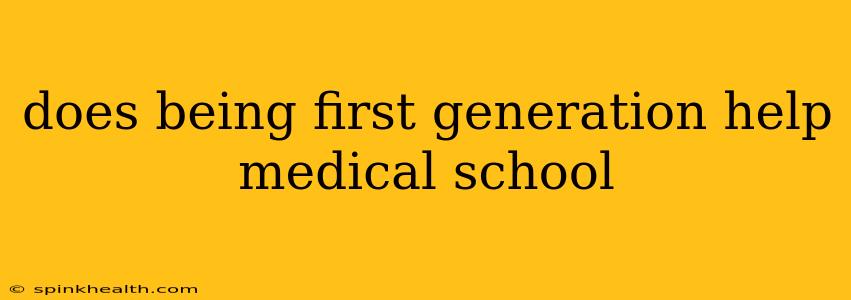Does Being First-Generation Help Medical School Applications? A Story of Resilience and Triumph
The crisp autumn air nipped at my cheeks as I stared at the acceptance letter, the words blurring through a happy haze of tears. My journey to medical school hadn't been a straight, paved road; it was more like a winding mountain path, fraught with challenges but ultimately leading to a breathtaking vista. And a significant part of that journey was being a first-generation college student. So, does being first-generation help medical school applications? The answer is nuanced, but the short version is: it can, significantly.
My story, like many first-generation students', is one of overcoming obstacles. I was the first in my family to even consider college, let alone medical school. Navigating the application process felt like deciphering hieroglyphics. The language of scholarships, standardized tests, and recommendation letters was foreign. There was no family history of higher education to draw upon, no seasoned mentors guiding me through the labyrinthine process. I had to learn everything from scratch.
But this struggle, this initial disadvantage, became my greatest strength. It forged in me a resilience, a determination, and a unique perspective that ultimately enriched my application.
What are the advantages of being a first-generation applicant?
Medical schools value diverse applicant pools, and the unique perspective of a first-generation student significantly contributes to this diversity. Admissions committees recognize the challenges overcome and the grit developed in navigating higher education without the established support systems enjoyed by others. Here are some key advantages:
1. Demonstrated Resilience and Overcoming Adversity: The challenges faced by first-generation students often translate into compelling narratives in personal essays. My own essay detailed the financial struggles, the academic hurdles, and the emotional toll of being the first in my family to pursue higher education. It wasn't just about listing difficulties; it was about showcasing how I overcame them. It highlighted my problem-solving skills, resourcefulness, and unwavering determination.
2. Unique Perspective and Understanding of Diverse Communities: First-generation students often come from diverse backgrounds, bringing invaluable perspectives to the medical field. My upbringing provided me with a deep understanding of the healthcare disparities faced by underserved communities – an understanding that is deeply valued by medical schools committed to social justice and equitable healthcare.
3. Strong Work Ethic and Self-Motivation: The need to be self-reliant and resourceful often instills a strong work ethic in first-generation students. I learned early on that success wouldn't be handed to me; I had to earn it through hard work and dedication. This self-motivation shines through in academic performance, extracurricular activities, and the overall application.
How can first-generation applicants best leverage their experiences?
While being first-generation is an advantage, it's not a guarantee of acceptance. Here's how to maximize its impact:
1. Craft a Compelling Narrative: Your personal essay is your chance to share your story authentically and powerfully. Focus on the challenges you faced, the strategies you employed to overcome them, and the lessons you learned along the way. Showcase your resilience, not just your struggles.
2. Seek Mentorship and Support: Don't hesitate to reach out for guidance. Many colleges and universities offer programs specifically designed to support first-generation students. Seek advice from professors, counselors, and other mentors who can provide valuable insights and support.
3. Highlight Your Achievements: Your academic record, extracurricular activities, and volunteer experiences all contribute to the narrative. Highlight achievements that demonstrate your commitment, perseverance, and potential.
4. Leverage Resources: Many resources are available to first-generation students, including scholarships, grants, and tutoring programs. Take advantage of these resources to ease the financial and academic burden.
Does being first-generation guarantee medical school admission?
No, of course not. Being first-generation is just one piece of the puzzle. A strong academic record, compelling extracurricular activities, and a well-written application are still crucial. However, your unique story, the resilience you've demonstrated, and the fresh perspective you bring to the table can significantly enhance your application. My journey proves that the path of a first-generation medical school applicant is challenging, but incredibly rewarding. It's a testament to perseverance, grit, and the power of overcoming adversity to achieve your dreams.

